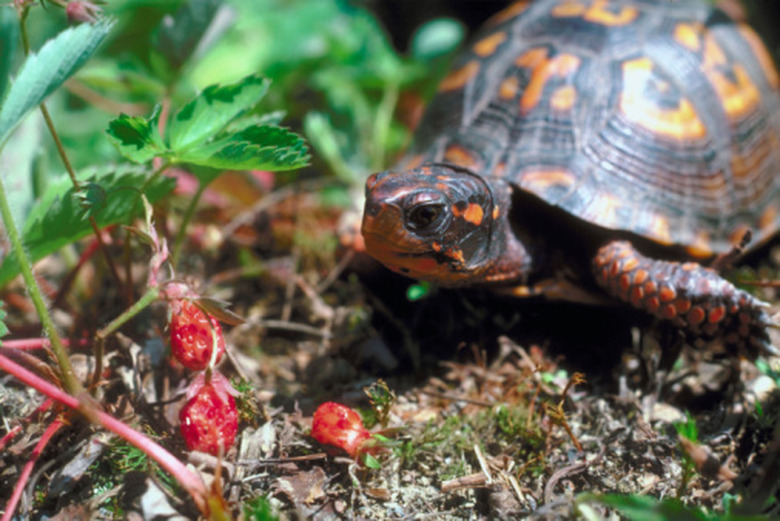Plants That Are Poisonous To Box Turtles
Box turtles are a type of land turtle ranging 3 to 8 inches in size, which means it often becomes a captive pet turtle. When caring for box turtles, it is important to understand the turtle's environmental and dietary needs so that you can provide the proper habitat. Certain plants are considered toxic for box turtles and you should never include them in the turtle's captive diet or environment.
Plants with Oxalates
Plants with Oxalates
Oxalate salts are irritating substances found in certain plants. These salts are found in the plant's sap and cause burning, pain, swelling and in severe cases, death, when contact with the substance occurs. Plants in this category include umbrella tree, split leaf philodendron, schefflera, pothos, philodendron, nephthytis, mother-in-law plant, dumb cane, Chinese evergreen, calla lily, caladium, Boston ivy and arrowhead vine.
Severly Toxic Plants
Severly Toxic Plants
These plants will cause severe symptoms if contact or ingestion occurs. The toxic effects of the plants in the severely toxic category cause severe damage to the organs of your turtle. Severely toxic plants include string of pearls, spider mum, pyracantha, periwinkle, parlor ivy, oleander, nightshade, needlepoint, morning glory, mistletoe, majesty, lantana, juniper, Jerusalem cherry, hyacinth, holly, heavenly bamboo, heart ivy, euphorbia and dianthus. Flowers such as daffodil, azalea, bird of paradise, shasta daisy, rhododendron, lily of the valley, lily of the nile, and buttercups are also severely toxic to box turtles.
Flesh Irritants
Flesh Irritants
The plants in the flesh irritant category cause irritation to box turtles' skin or any other animal that comes into contact with them. These are also potentially very dangerous to box turtles if ingested. Flesh irritant plants include boxwood, caladium, candytuft, crowfoot, elephant's ear, ficus, fiddleleaf fig, marigold, and rubber tree. Other plants such as juniper, umbrella tree and parlor ivy, though included in other categories in this article are also included as flesh irritants.
Unknown Toxins
Unknown Toxins
The plants included in this category are wild cards when it comes to toxicity. These plants cause different effects in different instances but are all known to cause toxic effects in the box turtles that consume them. Unknown toxin plants include:
- sweet pea
- poinsettia
- moether-in-law tongue
- grape ivy
- gardenia
Euphorbia may occasionally cause unusual effects as a toxin, so it also falls into this category along with the severely toxic category.
Cite This Article
MLA
Conrad, Jamie. "Plants That Are Poisonous To Box Turtles" sciencing.com, https://www.sciencing.com/plants-that-are-poisonous-to-box-turtles-13428210/. 21 July 2017.
APA
Conrad, Jamie. (2017, July 21). Plants That Are Poisonous To Box Turtles. sciencing.com. Retrieved from https://www.sciencing.com/plants-that-are-poisonous-to-box-turtles-13428210/
Chicago
Conrad, Jamie. Plants That Are Poisonous To Box Turtles last modified March 24, 2022. https://www.sciencing.com/plants-that-are-poisonous-to-box-turtles-13428210/
